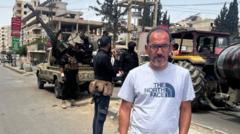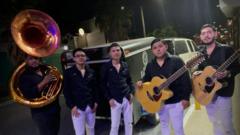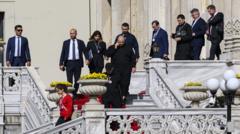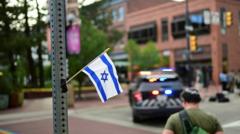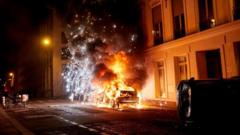As unrest spreads across Turkey, President Erdogan blames opposition parties for ongoing protests that began after Istanbul Mayor Ekrem Imamoglu was arrested on corruption charges, leading to calls for democracy and resistance against government oppression.
Protests Erupt in Turkey for Sixth Consecutive Night Amid Political Tensions
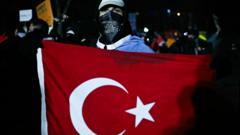
Protests Erupt in Turkey for Sixth Consecutive Night Amid Political Tensions
Turkish President Erdogan accuses opposition leaders of inciting violence as protests continue following the detention of Istanbul's mayor.
Turkey is witnessing its sixth consecutive night of protests as President Recep Tayyip Erdogan points fingers at opposition parties for allegedly inciting a "movement of violence." The unrest began last Wednesday after the detention of Istanbul Mayor Ekrem Imamoglu, who is viewed as a major political rival to Erdogan, on charges related to corruption. Imamoglu has asserted that the accusations are politically motivated, a claim that Erdogan refutes.
The Republican People's Party (CHP), Imamoglu's political faction, expressed intentions to partially conclude its demonstrations by Tuesday but did not clarify future courses of action. Erdogan has deemed the protests as "evil" and accused opposition parties of disrupting societal peace across the nation.
On Monday, law enforcement geared up for potential unrest, deploying vehicles equipped with water cannons. However, protests have generally remained peaceful, a stark contrast to the violent confrontations witnessed earlier in the week. Protesters, including many youths unfamiliar with leadership outside Erdogan's administration, have unified against the government, fostering a diverse array of political perspectives.
Demonstrators shared their fears of retaliation but articulated a sense of determination, expressing, "There is nothing left to lose." As of Monday evening, the Turkish government reported over 1,133 arrests linked to the protests, indicating a possible escalation of governmental crackdowns.
CHP leader Ozgur Ozel addressed protestors, framing their actions as a form of defiance against perceived authoritarianism. He declared his plans to visit Imamoglu, who remains incarcerated. The political implications surrounding Imamoglu's case could potentially impact the CHP's strategy for future elections.
Imamoglu has been charged with establishing a criminal organization, extortion, and associated offenses, which could bar him from contesting in upcoming elections if a conviction occurs. Despite his predicament, he was reaffirmed as the CHP's candidate for the 2028 presidential election.
Public sentiment is predominantly critical of Erdogan's leadership. As one 22-year-old protester indicated, the current regime is deemed "dictatorial," highlighting a continued call for the restoration of democracy and an end to the current political oppression. Comparisons have been made to the Gezi Park protests of 2013, which also sparked nationwide discussions around democracy and freedom in Turkey.
While the CHP may limit its planned rallies, the potential for spontaneous demonstrations remains high as citizens express demands for justice and accountability, including the release of Imamoglu and others detained during the protests.




